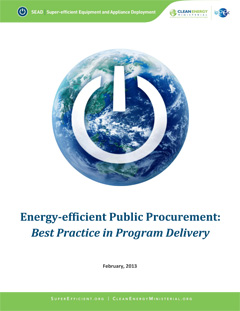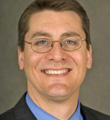18 September 2013

View Webinar Content
Presentation: Introduction to the webinar and panelists
Transcript—Webinar audio transcript
The public sector typically represents 2%–5% of total energy use and as much as 30% in some countries according to the Energy Sector Management Assistance Program. Effective procurement policies can help governments save considerable amounts of money while also reducing energy consumption.
The Clean Energy Solutions Center partnered with the Super-efficient Equipment and Appliance Deployment (SEAD) initiative to provide this webinar-based training on key findings from Energy Efficient Public Procurement: Best Practice in Program Delivery. This report was published by the SEAD Initiative and discusses the challenges in delivering public procurement programs and presents creative solutions adopted by different countries to overcome these challenges. The following key points emerged from this analysis and are discussed during this training along with case studies from the EU, Sweden, the U.K. and the United States:
- Procurement policies reflect organizational priorities and allow programs to begin a transition from first cost to life-cycle cost based purchasing methods.
- A robust process for creating purchasing criteria is a crucial component of energy efficient procurement programs.
- Training programs can serve as a bridge between the policy, program resources, and desired outcomes.
- Sharing knowledge of procurement processes can improve the quality of tools and guides intended to help buyers comply with energy efficient procurement policy
- There are many barriers to tracking energy efficient procurement progress, but there have been effective strategies used by both the public and private sector that can be considered to improve tracking and compliance.
Panelists
 Abby Semple, Public Procurement Analysis
Abby Semple, Public Procurement Analysis
Abby Semple, LL.B. (Dub) is a public procurement consultant who has managed tenders on behalf of public sector clients in Ireland and the UK, and worked on the development of procurement law and policy at EU level. Her areas of expertise include the EU procurement directives, green and socially responsible procurement, life-cycle costing, framework agreements, contract design, and negotiation and supplier engagement. She has developed procurement criteria, tender documents, guidance and training materials on behalf of a number of authorities at local, national and international level, including the Irish Environmental Protection Agency, European Commission and the SEAD initiative. Abby writes and speaks frequently on procurement topics.
 Christopher Payne, Sustainable Federal Operations, Lawrence Berkeley National Laboratory
Christopher Payne, Sustainable Federal Operations, Lawrence Berkeley National Laboratory
Dr. Christopher Payne is the Deputy Group Leader of the Sustainable Federal Operations group at Lawrence Berkeley National Laboratory, where he leads projects supporting the development, implementation, and evaluation of energy efficiency and sustainability programs in the public sector. He has provided technical and policy assistance to the US Department of Energy's Energy Efficient Product Procurement program since its inception in the early 1990s.
